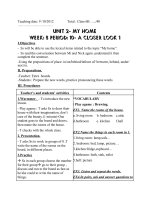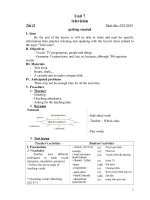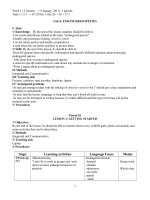ĐÁP ÁN TIẾNG ANH 8_LỚP THÍ ĐIỂM
Bạn đang xem bản rút gọn của tài liệu. Xem và tải ngay bản đầy đủ của tài liệu tại đây (96.37 KB, 2 trang )
<span class='text_page_counter'>(1)</span><div class='page_container' data-page=1>
<b> DẠY HỌC THEO CHỦ ĐỀ ( Từ tuần 22 đến tuần 24 )</b>
<b> MÔN TIẾNG ANH 8 ( thí điểm)</b>
<b>CHỦ ĐỀ : GRAMMAR ( Unit 7 + Unit 8)</b>
<b>KEYS (Đáp án) </b>
<b>A. CONDITIONAL SENTECES ( CÂU ĐIỀU KIỆN)</b>
<b>I. Put the verbs in brackets into the correct form.</b>
1.If the weather <i><b>is</b></i> nice, We’ll go to the beach tomorrow.
2. If he <i><b>studies</b></i> harder, he can pass an exam.
3. They may be late if they <i><b>don’t hurry .</b></i>
4. He’ll be ill if he <i><b>doesn’t stop</b></i> worrying so much.
5. If the factory <i><b>continues</b></i> dumping poison into the lake, all the fish and other aquatic animals will
die.
6. If you are kind to me, I <i><b>will be</b></i> good to you.
7. If we use water carefully, more people <i><b>will have</b></i> fresh water.
8.If people travel to work by bus, there <i><b>will be</b></i> fewer car fumes.
9.Factories w<b> </b><i><b>on’t dump</b></i><b> waste into rivers if the government fine them heavily.</b>
10. You <i><b>won’t pass</b></i> your driving test if you drive carelessly.
<b>II.Combine each pair of sentences to make a conditional sentence type 1 </b>
1. If teachers teach environmental issues at school, students will be more aware of protecting the
environment
2. If animals change their behaviour patterns, light pollution will happen.
3. If we switch from nuclear power to renewable energy sources, the levels of radioactive polluion
will decrease.
4. If the water temperature increases, some aquatic creatures are unable to reproduces.
5. People will get more diseases if the water is contaminated<i><b>.</b></i>
<b>III. Put the verbs in brackets into the correct form.</b>
1. If I were you, I (look) <i><b>would look </b></i>for a new place to live.
2. If Lan wasn’t ill, she ( join) <i><b>could join</b></i> out tree planting activity.
3.If there were fewer cars on the road, there (be) would be less pollution.
4.If people really cared about the environment, they ( not dump ) <i><b>wouldn’t dump</b></i> waste into the lake.
5.If there were no fresh water in the world, what (happen) <i><b>would happen</b></i> ?
6.If you (be) <i><b>were</b></i> the president, what would you do to help the environment ?
7.They get sick so often. If they (exercise) <i><b>exercised</b></i> more, they would be heathier.
8.If I (have) <i><b>had</b></i> one million US dollars , I would build more parks in our city.
9.Quan’s mother is sad. If Quan (tidy) <i><b>tided</b></i> his room every day, his mother wouldn’t be so upset.
10.There isn’t a garden at house .If there (be) <i><b>were</b></i>, we could grow vegetables.
<b>IV.Write a conditional sentence type 2 for each situation, as in the example. </b>
1.If there were not so many billboards in our city, people could enjoy the view.
2.If there weren’t so much light in the city at night, we could see the stars clearly.
3.If we turned on the heater all the time, we would have to pay three million dong for electricity a
month.
4.If the karaoke bar didn’t make so much noise almost every nigh, the residents wouldn’t complain to
its owner.
5. She wouldn’t have a headache after work every day if she didn’t work in a noisy office.
<b>B. PRESENT TENSES ( CÁC THÌ HIỆN TẠI)</b>
</div>
<span class='text_page_counter'>(2)</span><div class='page_container' data-page=2>
1. He <i><b>speaks</b></i> English so well because he <i><b>comes</b></i> from England.
2. <i><b>Do</b></i> you usually <i><b>go</b></i> away for Christmas or <i><b>do</b><b> </b><b> </b></i>you <i><b>stay</b></i><b> at home?</b>
3. Mary <i><b>swims</b></i> very well, but she <i><b>doesn’t run</b></i> very fast.
4. <i><b>Does</b></i> Mary's flight take off at 7a.m tomorrow morning?
5. You can take a taxi home if you <i><b>want</b></i> to leave now.
<b>II. Put the verbs in the present progressive tense (Chia động từ ở thì hiện tại tiếp diễn)</b>
1. Where's John? He <i><b>is listening</b></i> to a new CD in his room.
2. I can't talk on the phone now. I <i><b>am driving</b></i> home.
3. At present, the National Cherry Blossom Festival <i><b>is occuring</b></i> in Washington, D.C.
4. Shh! The boss <i><b>is coming</b></i> .We <i><b>are meeting</b></i> him in an hour and nothing is ready!
5. What <i><b>are</b></i> you doing next Saturday? Nothing special. I am staying at home.
<b>III. Put the verbs in the present perfect (Chia động từ ở thì hiện tại hoàn thành)</b>
1. I <i><b>have worked </b></i>here for three years.
2 . <i><b>Have</b></i> you ever <i><b>been </b></i>to New York?
3. I <i><b>have</b></i> just <i><b>seen</b></i> Andrew and he says he <i><b>has </b></i>already <i><b>done</b></i> about half of the plan.
4. Is this the second time he <i><b>has lost</b></i> his job?
5.My father <i><b>hasn’t played</b></i> any sport since last year.
<b>IV.Put the verbs in the correct present tenses: present simple/ present progressive /present</b>
<b>perfect</b>
1. Jane <i><b>works</b></i> hard all day but she isn’t working at the moment.
2. Look! That boy <i><b>is running</b></i> after the bus. He <i><b>wants </b></i>to catch it.
3. I <i><b>live</b></i> with my parents but right now I <i><b>am staying</b></i> with some friends for a few days.
4. Tomorrow I <i><b>am going</b></i> to leave for home. When I arrive at the airport, Mary <i><b>is waiting</b></i> for me.
5. <i><b>Have</b></i> you ever <i><b>eaten</b></i> Sushi? – Yes, I <i><b>have</b></i> it every weekend.
6 She <i><b>hasn’t come</b></i> here for a long time.
7. I <i><b>have just decided</b></i> to start working next week.
8. <i><b>Have</b></i> you <i><b>been</b></i> there before? Yes, I <i><b>am spending</b></i> my holidays there next summer.
9. What <i><b>are </b></i>we <i><b>having</b></i> for dinner tonight?
10. A koala <i><b>spends</b></i> about 18-20 hours sleeping in tree forks.
11. It’s only my first week in Wales, and I <i><b>have seen</b></i> so many interesting things already.
12.The kangaroo <i><b>has become</b></i> a symbol of Australia since 1773.
13. The bald eagle, an American symbol, <i><b>doesn’t live</b></i> in any other places besides North America.
14. The Taylors <i><b>are not staying</b></i> in New York now. They <i><b>have moved</b></i> to San Francisco since last
month.
15. In Canada you should maintain eye contact while you <i><b>are shaking</b></i> hands.
16. John <i><b>has just bought</b></i> the airplane ticket. He <i><b>is visiting</b></i> his parents in New Zealand next week.
17. She <i><b>has</b></i> a yoga class tomorrow afternoon.
</div>
<!--links-->









